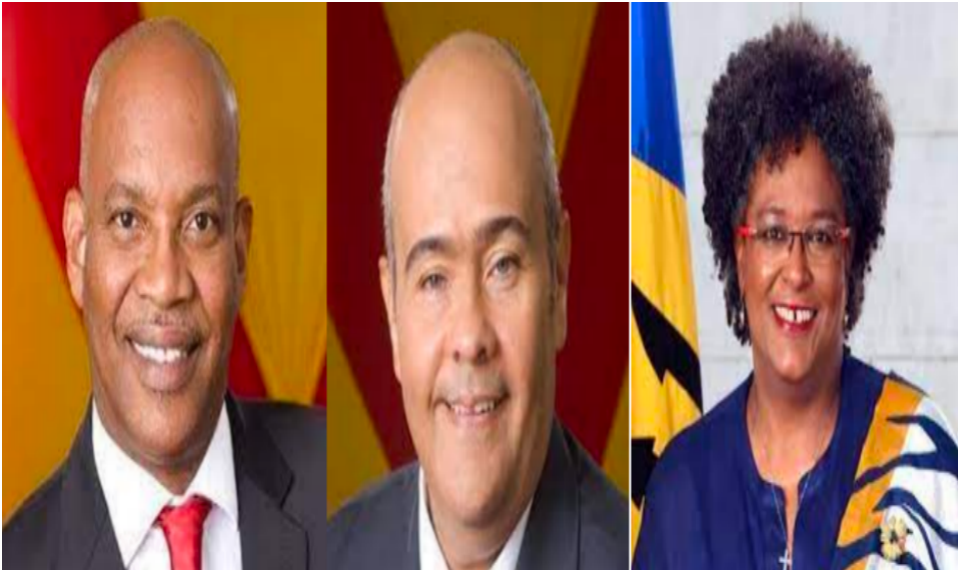Submitted by Nero (real name withheld by request of the author)

Perusing the Sunday newspapers there was the usual parade of items that caught the attention of journalists, and the ministerial agenda, Hon. Richard Sealy at a camp, Hon. Esther Suckoo opening a library, Hon. Steve Blackett at Cropover, Hon. David Estwick and Delisle Worrell laughing at dinner. Sir Ronald Sanders’ article stood out in sharp contrast, a commentary on the Owen Arthur speech in Bahamas, prompting the writer to urge immediate action by governments for the sake of our future. It reminded me that I had got my hands on that speech, and I needed to read it.
I interrupted my viewing of the National Youth Forum, where our very talented children were performing confidently, to read the Arthur speech. The import and the stark incongruity of the state of the regional economies as a result of this global crisis and the beaming confidence of our children in our leaders to do more than provide then with a ‘voice’ but to work competently to guide the economic affairs of our country to provide them with a future, could not help but to have sprung to mind.
DIMENSIONS OF THE ECONOMIC CRISIS
Excerpts of the speech given by the Hon Owen Seymour Arthur in Bahamas June 2010
The Caribbean society has, throughout its history, lurched from one economic crisis to the next; and has in the process, developed special attributes of resilience as one of its major assets.
The recent experience has however been extraordinary, not only because of the scale and scope of the adverse effects which have represented the region’s share of the global economic and financial crisis. It has been extraordinary because, while dealing with those effects, most of its economies have had to contend with three other sets of economic forces which have imposed on them the obligation to carry out major transformations to their economic structure at great costs, or to make major adjustments that have significantly narrowed the policy space within which they operate.
To begin with, the onset of the 2008 global crisis found some Caribbean economies still in the midst of dealing with the consequences of the loss of trade preferences. By some calculations this resulted in a permanent loss of between 1% – 2% of GDP, the deterioration in their fiscal circumstances, a substantial reduction in their foreign exchange earning capabilities, and the lost of in excess of 60,000 jobs in the OECS.
Secondly, the start of the 2008 crisis found most Caribbean economies still groggy from the impact of the fuel and food prices crises that had taken a heavy toll on the households and enterprises across the region between 2006 and 2007.
The third set of forces has led to consequences that have been far more invidious.
By 2008, the Caribbean had in its midst some of the world’s most heavily indebted economies. At least six of the countries had debt that exceeded 100% of their GDP, with that of St. Kitts and Nevis approaching 200%.
All of the OECS countries had entered a programme arranged by their Central Bank to reduce their debt/GDP ratio to 60% by 2020 – a task that will entail such major expenditure reduction as to leave virtually no room for any fiscally-induced economic stimulation.
A similar programme to bring about fiscal and debt sustainability had also set in train in Jamaica and Belize where the debt/GDP also exceeds 100%. And the Government of Barbados committed itself in its Medium Term Fiscal Strategy to realise an overall surplus by 2015 in pursuit of policy to reduce its debt to more sustainable proportions.
The global crisis confronted these countries with a stark situation which amounts to a dilemma.
To carry out the programmes to bring about fiscal and debt sustainability they would have to pursue policies to reduce expenditure, which could in turn deflate the economy. On the other hand, to offset the worst effects of global recession, stimulation of the economy by fiscal and other tools was necessary. No easy answer can or has been found to such a dilemma.
IMPACT OF GLOBAL ECONOMIC CRISIS
The global economic and financial recession in 2008 therefore only added a significant and additional new set of economic challenges to a pre-existing situation which would itself have put the economies concerned to the sternest test.
In a most insightful presentation, “Global Economic Crisis: CARICOM Impacts and Responses”, Professor Clive Thomas has asserted that the negative impacts of the global crisis have been transmitted to the Caribbean through ten major channels.
These include deterioration in the terms of trade, the volatility of exchange rates, difficulties in accessing trade credit and finance, the reduction in aid flows and the loss of opportunities for contract employment in North America.
He also cited financial contagion, as reflected in the collapse of the CLICO Financial Group and Stanford Financial Group, as one of the more damaging consequences of the global crisis.
However in terms of sheer financial volumes, the principal effects of the Global Economic crisis were transmitted through these major channels – the significant reduction in Direct Foreign Investment Flows, the decrease in remittances, and the substantial fall in foreign exchange earnings from the sale of goods and services that have occurred between 2008 and 2009.
Of these, the reversal of the recent trends in private capital flows is arguably the most significant.
Indeed, one of the major features of the pre-crisis performance of the Caribbean economy was the surge in private direct investment, principally to finance the development of new production capacity in the regional tourism sector.
Indeed, the Economic Commission for Latin America and the Caribbean has reported that the volume of private direct investment to the region virtually doubled between 2006 – 2008, rising from US$5.9 billion to US$10 billion over the period.
The flow was significantly reversed in 2009, when the volume of FDI to the region plunged by 42.1% to $5.7 billion. Evidence of this major reversal is to be found in the large number of investment projects which have been temporarily halted or deferred in virtually every Caribbean country because of the global credit crunch.
There has also been a significant reversal in the flow of remittances to the region.
In this respect, it has been estimated by the World Bank that the value of remittances to the Caribbean amounted to US$3 billion in 2008. The Caribbean Development Bank’s Annual Report for 2009 however indicates that “some regional economies reported significantly reduced inflows of remittances in 2009”.
The regional tourism sector which had averaged annual growth of 7% between 2000 – 2007, recorded a fall of 7% in 2008, and a decline in receipts in the order of 6% in 2009. The offshore financial industry of the region was similarly adversely affected.
The global economic crisis also significantly impaired the performance of the major services and commodities export sectors of the Caribbean.There was also evidence of a sharp contraction in the region’s bauxite/alumina industry and the production of steel in Trinidad and Tobago.
Taken together, the reversal of the flows of FDI, the reduction in the value of remittances and the significant decrease in the receipts from the exports of goods and services led to the situation where the regional economy was effectively destabilized between 2008 and 2009 by an unprecedented decline in foreign exchange receipts, amounting to almost $10 billion.
This amount relates only to the shortfall in foreign exchange receipts. It however does not capture the other financial obligations that have had to be assumed by Caribbean States of late, such as the extent of the financing required to fix the CLICO debacle, or that which is needed to support the programme of structural diversification which still has to be implemented to replace production capacity that has been lost through the erosion of trade preferences. Neither does it capture the extent of financial adjustment that the respective economies have to undertake to successfully carry out the programme to restore fiscal and debt sustainability over the short and medium term.
My question is, in the midst of this economic disaster where are our leaders, where are the voices speaking to this unprecedented crisis, educating our people to its consequences, and more importantly, where is the articulation of a comprehensive plan, to match the magnitude of the challenge, and to discuss the impacts of the shortfall should we lack the wherewithal. Will the medium term strategic plan make this grade and help us climb this mountain? What does every citizen need to do and prepare for, so we can work together to improve our situation and buttress ourselves against the hardships to come. If our government will not do it, should CERO add this to the list of disasters for which we need a hurricane plan, and citizens be given 48 hours warning, not meaning to be facetious.
Barbados and the Caribbean are not only faced with a dilemma not of their own making but are currently plagued by unprepared elected leaders who prioritize responses to political pressures and political agendas over the task of the management of the economy through this crisis. Resources urgently needed to boost tourism, manufacturing and to protect jobs, not only are they cut but critical social services such as health and education. There are other priorities. Meanwhile ministers fill the airwaves with dialogue directing the public’s attention to constituency councils, camps, constituency reports, housing and national youth fora, as though these are the real things that matter at this time.
Austerity measures in the European market will slow down tourism recovery, and the unsteady recovery of the American economy and jobs will further reduce our earnings from tourism and financial services. This can create the dreaded extension of this recession, beyond 2012. Meanwhile the children sing and dance on my screen, heedless that the next three years school leavers (9000) will hardly find the jobs or business opportunities for which we educated them, a social crisis in the making. Dance children, dance…
All may not be lost, the new Prime Minister of Barbados Mr. Freundel Stuart (Acting), and thus leader of CSME may yet return with a report on a plan put to the heads of government to rescue the region. Dance children, dance.




The blogmaster invites you to join the discussion.